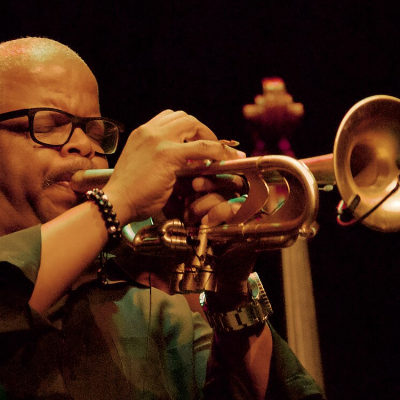The correct answer is Howard McGhee!
During 1945-1949, Howard McGhee was one of the finest trumpeters in jazz, an exciting performer with a sound of his own, who among the young bop players, ranked at the top with Dizzy Gillespie and Fats Navarro. The “missing link” between Roy Eldridge and Fats Navarro (Navarro influenced Clifford Brown who influenced most of the post-1955 trumpeters), McGhee originally played clarinet and tenor, not taking up trumpet until he was 17. He worked in territory bands, was with Lionel Hampton in 1941, and then joined Andy Kirk (1941-1942), being featured on “McGhee Special.” McGhee participated in the fabled bop sessions at Minton’s Playhouse and Monroe’s Uptown House, modernizing his style away from Roy Eldridge and towards Dizzy Gillespie. He was with Charlie Barnet (1942-1943), returned to Kirk (where he sat next to Fats Navarro in the trumpet section), and had brief stints with Georgie Auld and Count Basie before traveling to California with Coleman Hawkins in 1945; their concise recordings of swing-to-bop transitional music (including “Stuffy,” “Rifftide,” and “Hollywood Stampede”) are classic. McGhee stayed in California into 1947, playing with Jazz at the Philharmonic, recording and gigging with Charlie Parker (including the ill-fated “Lover Man” date) and having an influence on young players out on the Coast. His Dial sessions were among the most exciting recordings of his career, and back in New York he recorded for Savoy and had a historic meeting on record with Navarro in 1948 on Blue Note.
Eventually, drugs began to affect McGhee’s career. He traveled on a USO tour during the Korean War, recording in Guam. McGhee also had sessions for Bethlehem (1955-1956) but was inactive during much of the ’50s. He recorded some strong dates for Felsted, Bethlehem, Contemporary, and Black Lion during 1960-1961, and on a quartet outing for United Artists (1962), but (with the exception of a Hep big band date in 1966) was largely off records again until 1976. He had a final burst of activity during 1976-1979 for Sonet, SteepleChase, Jazzcraft, Zim, and Storyville, but by then, McGhee was largely forgotten and few knew about his link to Fats Navarro and Clifford Brown.
– Scott Yanow, from All Music Guide to Jazz
__________
Howard McGhee is part of an amazing sextet playing “Buzzy” in a filmed performance
*



































Freddie Webster
Girish